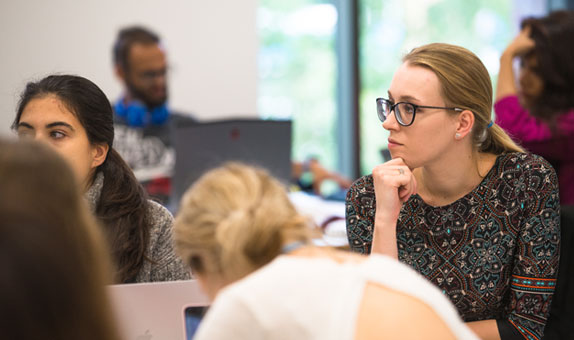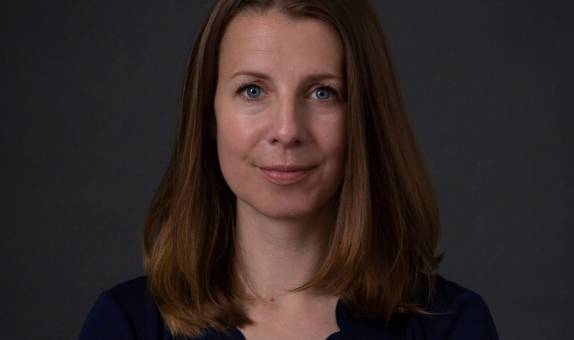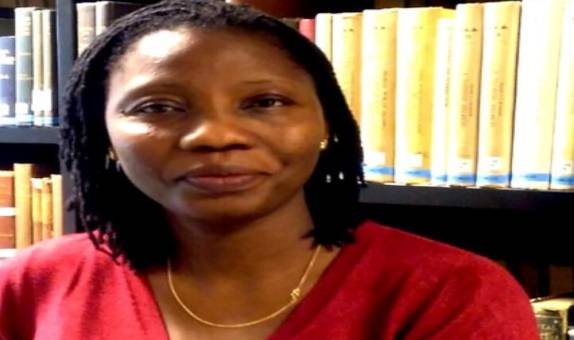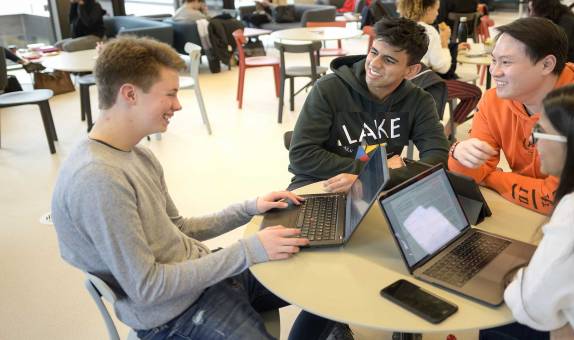Criminal Justice BSc (Hons)
Why choose this course?
This course will enable you study a wide range of criminal justice topics, considering the causes of crime, its consequences for individuals and society, and responses to crime.
You will explore how the criminal justice system works, including policing, imprisonment and rehabilitation strategies.
Notions of justice in a global context will be considered, alongside an examination of justice and miscarriages of justice through case studies. You will hear from practitioners who work in the criminal justice system and have opportunities to conduct field work in areas of criminal justice in order to root your classroom learning in real world situations.
| Attendance | UCAS code/apply | Year of entry |
|---|---|---|
| 3 years full time | M290 | 20242025 |
| 4 years full time including sandwich year | M292 | 20242025 |
| 4 years full time including foundation year | M291 | 20242025 |
| 6 years part time | Apply direct to the University | 20242025 |
Please note: Teaching on this course may take place on more than one KU campus.
| Main location | Penrhyn Road |
Reasons to choose Kingston University
- Through a work placement or volunteering internship option you will be able to apply and practice your skills and gain valuable experience for your future career.
- You will learn about the criminal justice system, debate the application of justice, and consider miscarriages of justice in a case study approach.
- You will learn from fieldwork and practitioners to root your studies in real world contexts.
Kingston's Department of Criminology, Politics and Sociology
What you will study
Year 1
Year 2
Optional year
Sandwich year
Final year
In Year 1, you will be introduced to a range of theoretical perspectives and debates that inform criminology, and the institutions, processes and legal foundations of the criminal justice system in England and Wales. You will learn about how social order is produced and reproduced and the relationship between formal criminal justice institutions and wider practices of social control. You'll understand how researchers utilise qualitative and quantitative research methods and will gain hands-on experience of research skills.
Core modules
Foundations in Criminological Theory
30 credits
This module will introduce students to a range of theoretical perspectives and debates that inform criminology, and which underpin their learning throughout the criminology programme. Theories will be evaluated in relation to academic scholarship, empirical evidence, popularity and application in crime policy and practice, and in relation to their geographical, social, cultural, historical locations.
Students will learn about a changing and dynamic field of study, which has encompassed both positivistic and social analyses of crime and criminalisation. They will learn to evaluate criminological theory in relation to a range of intellectual movements. They will be encouraged to understand criminological theory in relation to shifts across allied subjects like sociology, gender studies, critical race studies, social policy, politics and psychology.
Crime, Law and Justice
30 credits
This module will provide students with an introduction to the institutions, processes and legal foundations of the criminal justice system in England and Wales. The module is core to the undergraduate degree. The module familiarises students with the language and reasoning of the criminal law and the structure and chronology of the criminal justice process. There is an emphasis on the development and practice of key academic skills especially information retrieval.
Social Order and Social Control
30 credits
We live in a diverse society: we all have different opinions, values, goals, abilities, and want different things out of life. So how do we all manage to get along, how does society hold together? This module explores the ways in which societies attempt to impose a shape on themselves, to keep order and reproduce their values and structures. We will look at both the formal and informal, proactive and reactive measures through which societies try to control their members, and what happens when people resist those controls. We will also ask questions about the politics, powers and interests that underlie attempts to shape society in particular ways.
Introduction to Research Methods
30 credits
This module will focus your attention on how social scientists have utilised a range of qualitative and quantitative methods to research social life in its various forms. This module grounds your understandings of research methods through the practical application of data collection and analysis, and critical reflection on the research process. You will gain hands-on experience of research skills throughout the module that can be applied to future study and employability.
You will also be introduced to Future Skills through engagement with Navigate; an innovative programme designed to support your personal and professional development, and your ability to articulate your skills and graduate qualities in an external context.
In Year 2, you'll develop critical insight into key issues and controversies in the delivery of justice by our principal criminal justice institutions: the police, prison and probation services. You will explore the range of different penalties available and the changing ways in which ‘justice' is conceptualised and delivered. Alongside this you will build upon your existing research skills by working on a project on a topic of your choice. You will have the opportunity to specialise in your main interests via a choice of modules.
Core modules
Criminal Justice: Policing, Prison and Probation
30 credits
This module provides you with a critical insight into key issues and controversies in the delivery of justice by our principal criminal justice institutions: the police, prison and probation services.
You will learn about the historical context of these key institutions of justice, as well as the main issues confronting the criminal justice system in the 21st century.
You will explore the range of different penalties available, from fines and community sentences to restorative justice, and the changing ways in which ‘justice' is conceptualised and delivered, or not delivered, in the present day, particularly with respect to the changing place of the victim. You will connect theory to practice through projects in partnership with external organisations.
Researching Social Problems
30 credits
In this module you will work in small groups to research and address a social problem that affects your local community or society at large. You will choose a topic from a set list and individual members of the group will explore different aspects of the problem. Examples of potential topics include:
- Loneliness and social isolation
- Knife crime and gang violence
- Social media and online harms
- Cost-of-living crisis
- Health inequalities
- Access to justice
- Resettlement after prison
As a team you will bring together your research to construct an informative display which details the problem and recommends solutions or policies to address it.
During the module you will learn about the substantive topic you choose and practice research methods so that you will grow in confidence of your ability to identify, investigate and detail social problems with a view to offering solutions or policy responses.
You will also take part in an Assessment Centre Experience which helps you to develop your skills for graduate job applications and interviews. There will be an opportunity to reflect on your own personal development as part of the process.
Optional modules (choose 60 credits)
Diversity and Discrimination in the Criminal Justice System
30 credits
This module will enable students to contextualise criminology's past and present engagement with diversity and discrimination. The relationship between crime and discriminatory processes will be explored within different contexts such as within the law, prisons and cultural practices (e.g. FGM). The responses of the criminal justice process to diversity will also be discussed and evaluated with regard to institutional racism and domestic abuse. In addition, students will critique the gendered social construction of the categories of 'offender' and 'victim'. This will be further challenged by the exploration of female membership and affiliation with criminal gangs and their perpetration of crimes, and male victims of sexual violation.
Securing Human Rights: Contemporary Themes and Issues
30 credits
This module introduces the contested and evolving relationships between the theory and practice of securing human rights. It starts with an overview of key frameworks and mechanisms designed to secure rights at the international, regional and domestic levels. A central feature of the module is to introduce current critical themes, from which issues can be dissected and analysed through a range of contemporary and international case-studies. Key themes of the module may include (but are not limited to): human rights and populism, people on the move, free speech in a changing word, truth, justice and reconciliation', etc.
The module concludes by asking: what is the future for human rights?
Law and Society
15 credits
Legal rules, norms, systems, institutions, and processes are central to the construction and governance of human societies. At the same time, social conventions, relationships, and values are fundamental in the practice of defining acceptable and unacceptable behaviour in society and for regulating social and economic relations.
Understanding the relationship between law and society is therefore central to our understanding of current and emerging challenges and problems, such as the normalisation of artificial intelligence and responses to the climate emergency.
In this module, you will study a range of theoretical approaches and perspectives in the subject of law and society. You will evaluate current social problems in which law is implicated and design appropriate policy interventions.
Fear of Crime and Victim Support
15 credits
This module explores fears and concerns about crime and the impact that experience of offending can have on victims. We will look at the different emotions associated with crime, how we measure and understand reactions to crime scientifically, and how this relates to public policy towards crime.
We will also explore critiques of the concept of ‘fear of crime' and its role in the legitimisation of the criminal justice system. Building on this we will look at the impact that crime and anxieties about crime have on victims, the structures and practices associated with victim support, and the changing place of victims within the criminal justice system.
Thinking more critically we will explore the construction of the idea of the ‘victim', how it is differentially applied, and its implications for the people to whom it is, or is not applied.
Crime Prevention and Community Safety
15 credits
Crime prevention is a fundamental part of modern policing and is the subject of a range of specialist research and theorising and an associated body of legislation and practice. The Crime and Disorder Act 1998 requires local authorities to enter into partnerships with the police and a range of other ‘responsible authorities' in order to reduce crime and disorder in communities. These ‘community safety partnerships' have a duty to assess risk and potential harms to the community and to engage with the public in the process of setting the priorities for local action plans to reduce those risks and harms. This module will guide students through the history, theory and practice of crime prevention, exploring its intellectual and political roots and critically analysing its effectiveness and impact.
Criminal Law
30 credits
This module studies the general principles of criminal liability, definitions of what constitutes particular crimes and offences, and how that law affects particular circumstances. This involves not only a critical examination of the law, but also, using hypothetical factual situations, an understanding its detailed application.
Study abroad optional year
You have the option to take an additional year to study abroad or to undertake a year-long work placement overseas (or even a mix of both).
This course has a sandwich year option which takes place between Year 2 and your Final year. During this sandwich year you will take a placement within a relevant setting, ensuring you gain essential experience to add to your CV and help you secure a graduate job.
In your Final year, you will carry out a criminal justice project as part of a live brief provided by an organisation, or an issue identified by an NGO or policy institute relevant to criminal justice. You will take part in activities and discussions to develop your understanding of the dynamics that underlie conflicts and the process of dispute resolution. You will also choose from a range of specialist modules that suit your area of interest.
Core modules
Criminal Justice Project
30 credits
This module provides you with an opportunity to develop your criminal justice specialism and graduate employability skills. You will conduct an in-depth study on a live brief provided by an organisation, or a problem identified by an NGO or policy institute relevant to criminal justice, and present the research at a conference.
You will be tutored in the skills necessary to successfully complete the research project and you will work with a supervisor to develop a critical understanding of your research topic. You will also work in a peer-group to help organise the conference at which you will present your work.
You will develop key skills such as project management, the ability to work independently, presentation and teamworking. You will be encouraged to reflect on your skills and experiences to develop a CV and a career plan.
Alternative Dispute Resolution
30 credits
This module makes extensive use of role-play in order to develop a deeper understanding of the dynamics that underlie conflicts, and of the process of dispute resolution. Comparisons are made with litigation and with other adversarial and quasi-judicial mechanisms to place mediation and negotiation in context. Themes are identified and discussed, often using role-plays, and the social and psychological aspects considered. The module also covers theories of conflict and conflict management, and the general landscape of alternative dispute resolution.
Optional modules (choose 60 credits)
Criminology and the Law
15 credits
This module brings criminological theories and perspectives to bear on the uses of criminal law in contemporary societies. Students will have the opportunity to think critically about selected current and emerging topics in criminal law and explore how the relationship between the elements of crimes and the processes of criminalisation change over time.
As new technological developments present challenges to existing frameworks in criminal law, offending behaviour in cyberspace and the uses of artificial intelligence in the delivery of criminal justice raise important criminological issues in law reform. Similarly, popular and media narratives about social disorder often expose the limits of the criminal law and how such limits may be justified – should the criminal law have a place in the construction of the self and identities in public and private spheres?
The module examines a range of current and emerging problems that raise questions about law and power in crime control, individual autonomy and consent, security and liberty in criminalisation and decriminalisation, surveillance technology in law enforcement, and the protection of vulnerable groups.
Youth Justice
15 credits
This module considers the rules, processes and institutions involved in responding to young offenders. Together, these elements shape what is deemed the youth justice system as separate from the standard criminal justice system designed for adults.
From the point of arrest through to sentencing, you will be equipped to analyse the relevant legal framework and wider criminological research.
This module also has an international dimension, covering the basis, evaluation and enforcement of international human rights standards.
Evidence and Miscarriages of Justice
15 credits
This module explores miscarriages of justice: the issues, circumstances, and responses to problems in criminal justice processes that result in wrongful convictions.
You will consider theoretical, empirical, and practical explanations of miscarriages of justice with particular focus on the nature and construction of evidence. Therefore you will also be introduced to the law of criminal evidence, with insights from forensic science, psychology, and sociology.
This module also examines significant case studies – some historical and some contemporary – with opportunities to consider developments in comparable jurisdictions. You will be exposed to current and challenging debates about justice, rights, innocence, remedies and compensation that surround these cases.
Applied Social Science: Work and Volunteering
30 credits
This is a Level 6 optional module that draws upon social science debates and knowledges. Students will learn by observing and undertaking work-based practice. The principle underlying this module is that worksites are important contexts for students to test, validate, expand upon, supplement and enrich their academic learning.
The module requires students to undertake a minimum of 40 hours of fieldwork in an organisational setting. The form that the fieldwork will take will depend upon the type of placement secured, but, typically it may involve interning, shadowing or volunteering in subject relevant placements (for example across social justice, criminal justice/crime prevention, welfare and support fields).
Whilst in their placements students are encouraged to think about the social aspects of organisations and working life, including their structural forms, interpersonal relationships and their practices. Students will be supported in securing their placement at Level 5 in preparation for the commencement of the module at Level 6.
Justice in Principle and Practice
15 credits
This module introduces you to philosophical underpinnings of justice, including ethics and morality. You will explore a range of case studies and the exercise of justice in different national and international contexts, including in response to war crimes and breaches of human rights, such as the work of the international criminal court and the role of truth and reconciliation commissions.
The module recreates real-world tasks you may encounter upon graduation in practitioner and policy focused environments. You will have flexibility in your assessments to grapple with justice in UK or international contexts.
Drugs and Criminal Justice
15 credits
This module considers the place of drugs in society, ways of policing of drugs, and justice issues concerned with the possession, use, and supply of drugs.
You will analyse the wider societal harms linked to drug use, including drug-related crime, as well as the politics of drugs control itself. You will learn about the effects of drug consumption and dependency on the individuals who use drugs, with a spotlight on the UK's most popular drugs of choice, both illegal (e.g. cannabis) and legal (e.g. alcohol), as well as the misuse of medicines.
You will engage in topical debates around the efficacy of drug prohibition in reducing supply/demand, the potential costs (monetary and social) of drug law enforcement, and the adoption of a criminal justice approach, as opposed to a health-based approach, to drugs.
Migration in a Global Context
15 credits
Global migration has intensified rapidly since 1960, with the UNPD estimating an increase from 80 to 210 million by 2009. It has become a contentious political topic with far-reaching consequences for contemporary societies, and arguably for established sociological paradigms (e.g. methodological nationalism).
The module will equip students to understand and investigate in depth the social dynamics of migration and its consequences, and enable them to offer informed and critical comment on contemporary debates (e.g. media coverage of migration, on the economics of migration, and on migration's consequences for social solidarity). It is organised to reflect on social issues such as social mobility, poverty, gender and education, inequality and citizenship as they relate to different types of international mobility, and to explore fundamental consequences of migration for shaping social relations at local and global levels.
This module will introduce students to current trends in migration flows, to the different types of human mobility and the dynamics behind them, and to governments' responses to the social, political and legal challenges raised by international migration. In addition, students will have the opportunity to develop their own professional thinking in this field.
Please note
Optional modules only run if there is enough demand. If we have an insufficient number of students interested in an optional module, that module will not be offered for this course.
Foundation year – Social Sciences
If you would like to study this degree at Kingston University but are not yet ready to join the first year of a BSc (Hons) course, you may want to consider studying this course with a foundation year.
Future Skills
Knowledge to give you the edge
Embedded within every course curriculum and throughout the whole Kingston experience, Future Skills will play a role in shaping you to become a future-proof graduate, providing you with the skills most valued by employers such as problem-solving, digital competency, and adaptability.
As you progress through your degree, you'll learn to navigate, explore and apply these graduate skills, learning to demonstrate and articulate to employers how future skills give you the edge.
At Kingston University, we're not just keeping up with change, we're creating it.

Kingston School of Law, Social and Behavioural Sciences
The School offers courses in economics, sociology, law, psychology and criminology. Our degrees are underpinned by a vibrant research culture and delivered by a blend of practitioners and academics who are dedicated to equipping you with the employability skills to thrive in your career.
You will have a wealth of opportunities outside the classroom to further your learning and gain hands-on experience in your chosen field.
Social Sciences Café
Social Sciences Café (SSC) is a series of events within the Department of Criminology, Politics and Sociology (CPS) which aims to help prepare students for life after graduation. Students can take part in seminars on employability skills and postgraduate studies; speaker and panel events on topical issues that engage the broader Kingston University (KU) community; and social events linked to key moments in the academic calendar.
SSC is often visited by KU graduates working in the public, private and third sector in the UK and around the world, who are keen to share their career journeys and advice for students at an early stage of their career planning, as well as professionals for ‘meet the employer' advice and networking sessions.
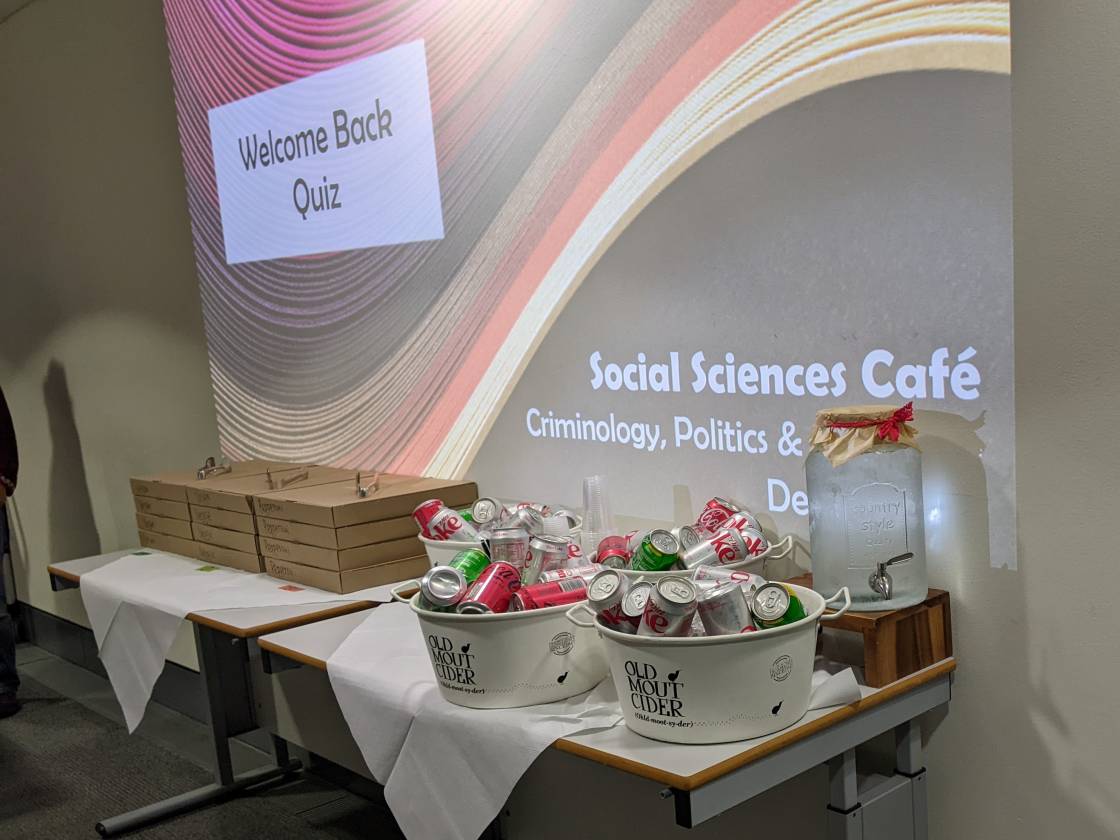
After you graduate
Graduates will be well placed for careers in the criminal justice system, charities, and the private sector.
There are many employers located in London. For example, the Police (six police services), the Prison Service (14 prisons) and Probation Service, 32 local authorities (community safety, trading standards, youth justice work), the Crown Prosecution Service, College of Policing, Security Service, the Police Foundation, Liberty, Amnesty International, the National Health Service (fraud), Amnesty International, private sector (e.g. G4S and Securitas) and Charities (e.g. Appeal, Victim Support, NACRO).
These organisations offer a range of roles, using practical skills (interviews, managing cases), analysis work (exploring data and crime trends), research (writing proposals and collecting research data), and management (managing security contracts, managing offenders).
You may also have the opportunity to apply for a postgraduate course required to become a probation officer, a conversion course/SQE to pursue a law career or a postgraduate qualification to pursue a research career in the Home Office and Ministry of Justice, among other research opportunities.
Specialist careers support
You will take part in an Assessment Centre Experience, providing the opportunity to experience the pathway to employment with tailored feedback to help develop your employability skills for the world of graduate employment.
- Develop your understanding of the jobs market, including current trends and opportunities, different recruitment processes and how to identify relevant roles
- Receive personalised feedback reports to help you to improve and progress
- Access additional webinars on top tips, employer expectations and best practice

Entry requirements
Teaching and assessment
Scheduled learning and teaching on this course includes timetabled activities including lectures, seminars and small group tutorials.
Who teaches this course?
You will be taught by an experienced teaching team whose expertise and knowledge are closely matched to the content of the modules on this course. The team includes senior academics and professional practitioners with industry experience. Postgraduate research students may also contribute to the teaching of seminars under the supervision of the module leader.
Course fees and funding
Additional costs
Depending on the programme of study, there may be extra costs that are not covered by tuition fees which students will need to consider when planning their studies. Tuition fees cover the cost of your teaching, assessment and operating University facilities such as the library, access to shared IT equipment and other support services. Accommodation and living costs are not included in our fees.
Key information set
The scrolling banner(s) below display some key factual data about this course (including different course combinations or delivery modes of this course where relevant).
Course changes and regulations
The information on this page reflects the currently intended course structure and module details. To improve your student experience and the quality of your degree, we may review and change the material information of this course. Course changes explained.
Programme Specifications for the course are published ahead of each academic year.
Regulations governing this course can be found on our website.




